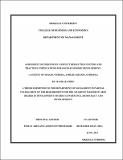| dc.contributor.author | Bamlak, Yideg | |
| dc.date.accessioned | 2014-10-06T15:39:31Z | |
| dc.date.available | 2014-10-06T15:39:31Z | |
| dc.date.issued | 2013-06 | |
| dc.identifier.citation | Bamlak Yideg (2013) Assessment of Indigenous Conflict Resolution Systems and Practices: Implication for Socio-Economic Development: A Survey of Simada Woreda, Amhara Region, Ethiopia, Thesis. Mekelle:MU. | en_GB |
| dc.identifier.uri | https://opendocs.ids.ac.uk/opendocs/handle/20.500.12413/4672 | |
| dc.description.abstract | Unless conflict is managed properly, it results in political, social and economical destruction of human beings. The cost of conflict depends on the type of conflict resolution system that individuals used to settle disagreements. The main objective of this study was assessing indigenous conflict resolution systems and practices and their implication for socio-economic development of the rural people in the study area. Specifically, the study identified the common types of conflict; the common causes of conflict; explored the economic advantage of indigenous conflict resolution system and restoring the social relationship of residents in the study area. Finally the study identified the challenges that indigenous conflict resolution system facing and the weakness that indigenous conflict resolution have. The study was conducted by using a sample of 176 household respondents who have ever experienced disputes. The household respondents selected using snowball sampling technique. Moreover, focus group discussions and interview were also employed to collect qualitative data. The study finds that 127 household respondents are involved in to land and land related conflict and land conflicts are increasing from time to time. The main causes of land conflicts are poor demarcation of boarder, inheritance problem and shortage of land and others. The study further explored the advantage of indigenous conflict resolution systems and practices to economic development. The household respondents who have used indigenous method of conflict resolution system helped them to save their money and time. Because of using this indigenous conflict resolution system, they have been restoring their relationship and inviting their conflict party and support each other. Furthermore, the study finds that to capacitate the ability of local elders the woreda government support is only confined to providing training and the process of selecting trainee is filed by corrupt practices. Lack of office for local elders also another challenge for the task of these local elders to perform their activity. Moreover, the practice of illegal gun trade challenges the daily life of the residents in the study area. The geographical location of the woreda surrounded by two major rivers; Abay/Nile and Beshilo Rivers which borders the study area with Goncha Sisso Enese and Saint Woreda respectively make the situation worst because it is difficult for security forces to control the area. This results in the loss of life of innocent peoples and security forces especially during market day. In addition, the Federal and regional governments release the prisoners following the coming of New Year before finishing their punishment and this is believed to aggravate the problem in which the victim side often takes revenge because of dissatisfaction with the decision of the government. There are different mechanisms that help to minimize the above problems. To minimize the problem of land and land related problems, the woreda land administration desk should immediately enter in to new demarcation process. It shall use the modern and scientific international land cadastre system by using GPS/ satellite navigation system in order to demarcate appropriately and reduce the complains like other woredas in the region. To minimize the problem of illegal gun trade, the woreda police office and woreda militia desk should work cooperatively with the adjacent woredas of Goncha Sisso Enese and Saint. | en_GB |
| dc.language.iso | en | en_GB |
| dc.publisher | Mekelle University | en_GB |
| dc.rights.uri | http://creativecommons.org/licenses/by-nc-nd/3.0/ | en_GB |
| dc.subject | Security and Conflict | en_GB |
| dc.title | Assessment of Indigenous Conflict Resolution Systems and Practices: Implication for Socio-Economic Development: A Survey of Simada Woreda, Amhara Region, Ethiopia | en_GB |
| dc.type | Thesis | en_GB |
| dc.rights.holder | Mekelle University | en_GB |


